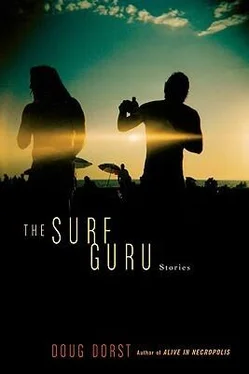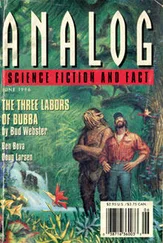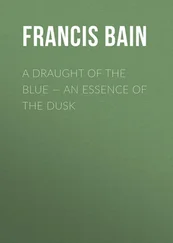There is a bottle of tequila on the corner of the bar, nearly full and unattended. I wonder, Is Lars setting a trap for me? Inviting me to steal from him while he watches me from beneath the folds of his eyelids, stroking his monkey and relishing the thought of the police dragging me away, humiliated? Well, he is right to expect me to steal from him, but he underestimates me. If I am going to steal for myself, I will not take something as insignificant as a bottle. I will steal something he loves. I do not yet have a plan, because Lars does not seem to love anything besides himself. Which is an excellent defense, I admit.
I keep my eyes to the floor and pay the bartender. I turn to leave, a new bottle in hand. “Manolo,” Lars shouts from his loft. “My most reliable customer.” I keep walking. Behind me I hear whispers, stifled laughs. “If you have come for a glimpse of your daughter,” he says, “you should know she will have nothing to do with you.”
I turn and look up. Without my glasses I see his face as a blur, but I know his expression — a scornful curl of lip under blond mustache, a creeping lopsided smile, blue eyes wide with mockery. He sits in front of a bright lamp that casts a halo around his head so that people who look up at him will think he is some kind of angel. I spit on his polished floor.
“Oh, Manolo. You must be so lonely,” he says loudly. It is important to him that everybody hear. “A nice girl would comfort you more than that bottle. One of Ysela’s friends, perhaps? I’m sure they would love to see where she came from.”
More laughter. The door seems very far away.
I know that every man in this room has paid his money to be with my daughter. Most have not said anything to me, but I can see it in their eyes when they come to buy my fruit. Some squeeze the fruit silently and stare at the ground while they hunt for money in their pockets. Others look me in the eye too directly, speak too loudly, listen too earnestly. I do not know which bothers me more. Even Vargas took his turn, once. The next morning he knocked on my door and confessed; he said he was sorry, he was drunk, he had been fighting with his wife, and Ysela was just so beautiful, and on and on. He begged me to blacken his eyes, so I did. We never spoke of it again. If I were to hold grudges, I would soon be out of friends.
“You are an evil man, Lars,” I say. I focus on a spot above his head so I do not have to meet his eyes.
Swinging from a crossbeam, Lars’s monkey screeches and bares its teeth at me. I hate that monkey, that filthy little beast in its purple velveteen coat. Lars laughs — a false, too-loud laugh that is for the benefit of everyone having a drink or waiting for a girl. “Good-bye, Manolo, and thank you for your business,” he says, waving me out.
“San Humberto punishes people like you,” I say. “If not now, then someday.” I turn my back on him and walk through the door and into the night. He shouts something that I cannot hear, and everyone inside laughs. He has the money, he gives the party, so people laugh.
I open the bottle and drink as I walk down the road. Tonight I will not touch the gun, will not clean it, will not cradle it like a baby. I swear it to myself.
In the morning, Vargas brings news from the jail, where Ayala and El Gris sit in adjoining cells. “Ayala does nothing but cry,” he says, mopping his brow with his sleeve. “He sobs so hard it is like he is having a seizure.”
“Why?” I say. “He is going to live.” It is our tradition that the worst criminal in the jail on the day of the Festival goes to the gallows. Ayala had been the only one behind bars; with the Festival so close, he must have expected he would hang. The capture of El Gris has spared him.
“Ayala wants to die,” Vargas says. “He wants to be with Concepción.”
Concepción was Ayala’s wife and one of Vargas’s sisters. She died of the green fever six months ago. The night after she was buried, Ayala went to the bar and drank himself senseless. When the bells tolled midnight, he jumped up and overturned his table, smashed bottles, kicked the monkey into the wall, and ran out. He went to the cathedral, where he stripped off his clothes and relieved himself all over the front steps. “I piss on your apostles! I shit on your saints!” he said. He shouted this again and again, dancing naked around the cathedral as we gathered in a crowd. He stopped, suddenly, and with a look of sudden, rapturous knowledge — as if he’d just glimpsed Truth itself — he said, “I will burn your God to the ground.” The police came as Ayala was pushing through the crowd, asking people if they had any matches he could borrow.
I open a crate of sapotes that was delivered this morning. “And El Gris?” I ask Vargas. “You have seen him?”
“Yes,” Vargas says. “He tries to comfort Ayala.” Vargas eyes the sapotes.
“Go ahead,” I say. He chooses one and cuts into the fibrous brown skin with a pocket knife.
“It is sad to see Ayala,” Vargas says. “A naked man in a bare cell. Even though the police do not need him for the Festival anymore, they still will not give him his clothing. They are afraid of what he may do to himself.”
“It is San Humberto’s will,” I say. “We live because it is our duty to live.”
“You have never wanted to die?” Vargas asks. He cuts a crescent of pink flesh away from the rind.
“What we want,” I say, “is irrelevant.”
I, too, lost my wife to a fever — to the fever of money and power that Lars brought to our town. It left Madalena dazed and desirous and vulnerable. Her note, which was delivered to me by Lars’ silk-clad coachman, made this plain: Lars can give the children everything you cannot. He is a gentleman and you are a boor. He is a respected businessman and you sell fruit of poor quality. At Mass the next morning, all of them — Lars, Madalena, Ysela, and Rubén — sat together, a false family looking down on the rest of us from Lars’s reserved seating area — which had been the choir loft until the bishop let himself be bought. I have not gone inside the cathedral since. Does San Humberto understand my reasons? I believe he does.
Two years ago, Lars and Madalena traveled to the capital city for a vacation. He came back; she did not. Lars and his coachman claimed she was killed when a small and unknown band of rebels began catapulting boulders into the city from the surrounding hills. Whether that is true or not, Madalena is gone, and there is nothing I can do.
The white marble tombstone that Lars’s unclean money bought is bigger than my house. It is a blindfolded angel pointing at the sky. When the shadows are longest, the wings of the angel darken forty-six other graves. I cannot read the epitaph because it is written in Latin. The final insult: the stone gives her surname as “De Los Pozos,” with capital D , capital L . What kind of man does not know how to spell his wife’s name? I asked Vargas if the stone could be corrected. “You do not have enough money,” he told me.
Eventually Madalena would have come back to me. I know this. Lars made her forget what is good and what is right, but one day the great saint would have opened her eyes, shown her that Lars is like the feijoa, a fruit that rots from the inside out, turning brown and foul-smelling underneath its shiny green skin. I may be a man who blackens eyes, cleans his gun, and dreams violent dreams, but I live by San Humberto’s example. I am not a bad man.
As much as El Gris deserves his punishment at the Festival, I would rather see Lars in his place, sweating and crying and helpless, knowing the floor will fall away beneath him, knowing his neck will soon be snapped and we, the true citizens of Ciudad San Humberto, will lead the hyenas to his swinging corpse. That is the picture I have in my head when I drop my coin into the well. I hear it clink at the bottom, metal on metal.
Читать дальше












